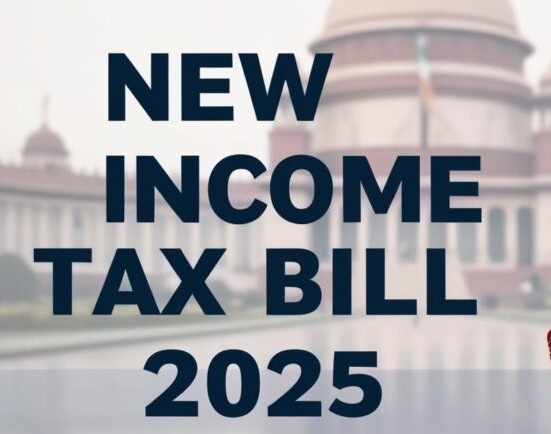Proposed New Income-Tax Bill, 2025 – Impact on NPOs

Pre-Independent India’s Income Tax Act were of 1860, 1886 and 1922. Independent India’s first Income Tax Act has been of 1961 and which is now proposed to be replaced by the Income Tax Bill 2025 after over six decades.

The New Income-Tax Bill, 2025 was introduced in parliament on Thursday, February 13, 2025. After introducing the Bill in Parliament, the finance minister urged the Lok Sabha Speaker Om Birla to refer the draft law to a select committee of the lower house which will submit its report by the first day of the next session of Parliament. Subsequently, before its final approval in Parliament, the Bill will be reviewed by the select committee.
If passed, the new law is expected to come into effect on 1st April 2026.
Clear & concise
The Bill aims to streamline and simplify tax provisions, making them easier to understand and reducing the potential for legal disputes. The Bill will also replace terminologies like ‘Assessment Year’ (AY) and ‘Previous Year’ with terms like ‘Tax Year’ (TY) as part of a move to simplify language while removing provisos and explanations.
The proposed new Income Tax Bill 2025 is a 622-page document while the current Act runs into 880 pages.
Registered Non-Profit Organization
The Bill introduces the term “Registered non-profit organization” to encompass various entities like trusts and institutions currently defined separately. It also clarifies the meaning of ‘registration’ and ensures existing registered NPOs maintain their eligibility for benefits.
Seamless transition for existing NPOs
The new Bill protects the eligibility of all currently registered NPOs, ensuring that those with valid registrations under Sections 12A, 12AA, 12AB, or Section 10(23C) can continue to claim benefits, provided their registrations have not been cancelled and transition smoothly under the revised framework without losing tax benefits.
Under the proposed new Bill, the fundamental principles pertaining to tax exemption and tax exemptions remain unchanged and thus earlier case laws on these issues will continue to apply even after the Bill is passed as Act.
Consolidating scattered provisions
The proposed Bill has revamped provisions related to non-profit organizations (NPOs), consolidating them into a dedicated part of the Act. This aims to address the complexity of existing regulations spread across various chapters and sections, often with numerous provisos and explanations.
The present provisions related to registered non-profit organisations are contained across the following Chapters:
- Chapter I: Section 2(15) which explains ‘charitable purpose’;
- Chapter III: Sections 10(23C), Section 11, Section 12, Section 12A, Section 12AA, Section 12AB, Section 12AC and Section 13 which cover provisions pertaining to tax exemption, registration, investments and violations;
- Chapter VIA: Section 80G which pertains to tax deduction for donors;
- Chapter XII: Section 115BBC, Section 115BBI which pertains to anonymous donations and accumulated income;
- Chapter XII EB: Section 115TD, Section 115TE, Section 115TF which pertain to accreted or exit tax on the NPO ceasing to be a charitable organisation.
As can be seen from the above, the provisions under the current Act are spread across several chapters.
Also, the provisions related to registered non-profit organisations have evolved over time, with several amendments which have been brought to the current Act in force in the form of ‘Explanations’ and ‘Provisos’. For example, in Section 11 itself, there are 13 Explanations and 16 provisos. The interplay of different provisos and Explanations makes it quite difficult to understand.
There has also been a substantial reduction of the words from the approximately 12,800 words to 7,600 words.
New renumbered provisions
Under the proposed new bill provisions pertaining to NPOs are divided into seven partscovering:
- Registration – Sec. 332 & 333
- Income of registered NPOs – Sec. 334 to 342
- Commercial activities by registered NPOs – Sec. 344 to 346
- Compliances – Sec. 347 to 350
- Violations – Sec. 351 to 353
- Donation eligibility u/s. 133(1)(b)(ii) – Sec. 354 (Old Sec. 80G)
- Interpretation (For various connotations used in the Bill) – Sec. 355
Key changes
- Regular Income under the new Bill includes, receipts from charitable or religious activities, receipts whether capital or revenue, income derived from property or investments, voluntary contributions, and permitted commercial activities.
- Regular income shall become taxable if less than 85% is applied for charitable purposes or not specifically accumulated. This principle is the same as at present under the Act of 1961.
- However, if at least 85% of the income is applied, the balance 15% will now be treated as “deemed accumulated income” and must be invested as per specified norms.
- Under the current law there is no requirement to invest this amount (15%) and nor is there any restriction on its future use. Under the new Bill, if such ‘deemed accumulated income’ is used in any subsequent financial year it will not be computed as application of income for that financial year.
- Under the Bill, the permitted modes of investment are prescribed separately under schedule XVI.
- The new Bill requires that if the NPO is registered as a public charitable trust, it should be an ‘irrevocable trust.’ If the trust deed does not have a specific citation that it is ‘irrevocable’ it could potentially face some problems when registering or renewing its registration with Income tax.